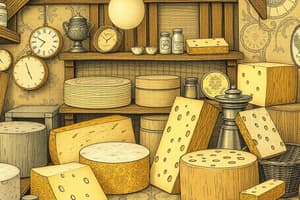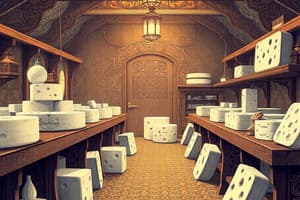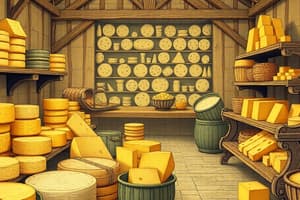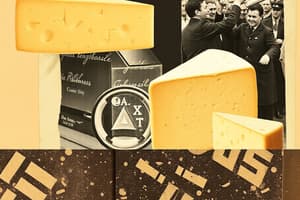Podcast
Questions and Answers
Where did the process of cheese-making likely originate?
Where did the process of cheese-making likely originate?
- Egypt
- Ancient Rome
- Ancient Greece
- The Middle East (correct)
What type of cheese is ricotta?
What type of cheese is ricotta?
- Semi-Soft Cheese
- Fresh Cheese (correct)
- Hard Cheese
- Semi-Hard Cheese
Why did the cheese go to the party?
Why did the cheese go to the party?
- Because it was lactose intolerant
- Because it wanted to get grated and have a gouda time! (correct)
- Because it loved the music
- Because it was a dairy product
What type of cheese is mozzarella?
What type of cheese is mozzarella?
How long has cheese been around for?
How long has cheese been around for?
What do you call a cheese that's not yours?
What do you call a cheese that's not yours?
What type of cheese is brie?
What type of cheese is brie?
How should you organize a cheese party?
How should you organize a cheese party?
What type of cheese is parmesan?
What type of cheese is parmesan?
Flashcards are hidden until you start studying
Study Notes
History of Cheese
- Cheese has been around for approximately 8,000 years, originating in the Middle East.
- The process of cheese-making was likely discovered by accident, when milk carried in animal stomachs curdled and separated into curds and whey.
- The art of cheese-making spread throughout the ancient world, with evidence of cheese production in ancient civilizations such as Greece, Rome, and Egypt.
Types of Cheese
- Fresh Cheeses: Soft, creamy cheeses that are not aged, such as ricotta, cottage cheese, and cream cheese.
- Soft-Ripened Cheeses: Cheeses with a soft, spreadable interior and a white or golden exterior, such as brie and feta.
- Semi-Soft Cheeses: Cheeses with a smooth, creamy texture and a mild flavor, such as mozzarella and gouda.
- Semi-Hard Cheeses: Cheeses with a firm, dense texture and a nutty flavor, such as cheddar and swiss.
- Hard Cheeses: Cheeses with a hard, granular texture and a strong flavor, such as parmesan and blue cheese.
Funny Questions About Cheese
- What's the best way to organize a cheese party? Alphabetize the cheese board, of course! (From a to gouda, naturally.)
- Why did the cheese go to the party? Because it wanted to get grated and have a gouda time!
- What do you call a cheese that's not yours? Nacho cheese!
Note: These funny questions are meant to add a bit of humor and whimsy to the study notes. They are not meant to be taken seriously or used as actual study material.
History of Cheese
- Cheese has been around for approximately 8,000 years, originating in the Middle East.
- The process of cheese-making was likely discovered by accident, when milk carried in animal stomachs curdled and separated into curds and whey.
- Cheese-making spread throughout the ancient world, with evidence of production in ancient Greece, Rome, and Egypt.
Types of Cheese
- Fresh Cheeses: soft, creamy cheeses that are not aged, e.g. ricotta, cottage cheese, and cream cheese.
- Soft-Ripened Cheeses: cheeses with a soft, spreadable interior and a white or golden exterior, e.g. brie and feta.
- Semi-Soft Cheeses: cheeses with a smooth, creamy texture and a mild flavor, e.g. mozzarella and gouda.
- Semi-Hard Cheeses: cheeses with a firm, dense texture and a nutty flavor, e.g. cheddar and swiss.
- Hard Cheeses: cheeses with a hard, granular texture and a strong flavor, e.g. parmesan and blue cheese.
Studying That Suits You
Use AI to generate personalized quizzes and flashcards to suit your learning preferences.




